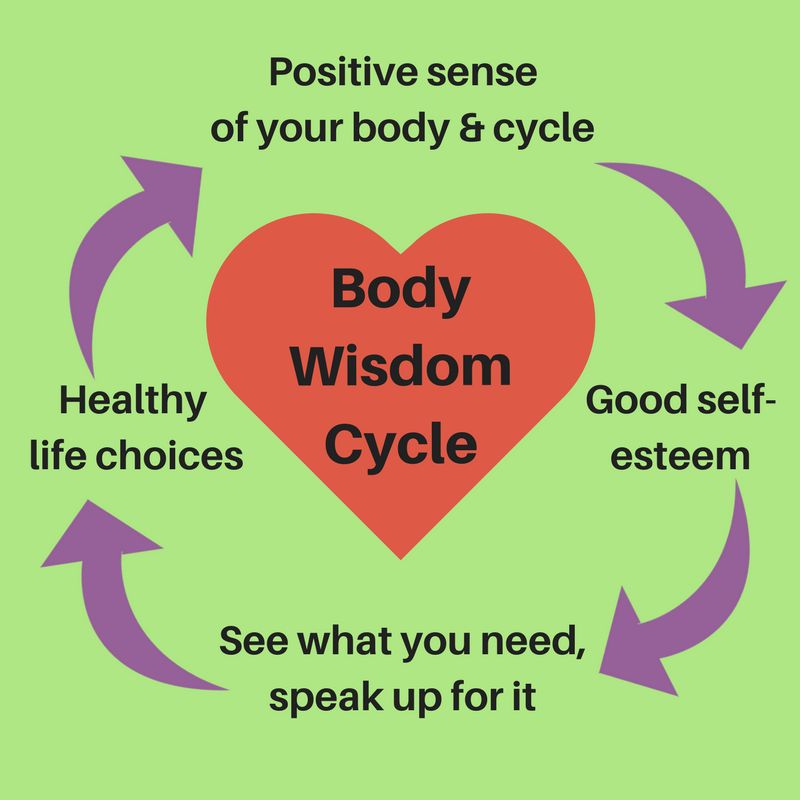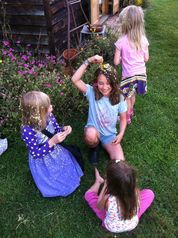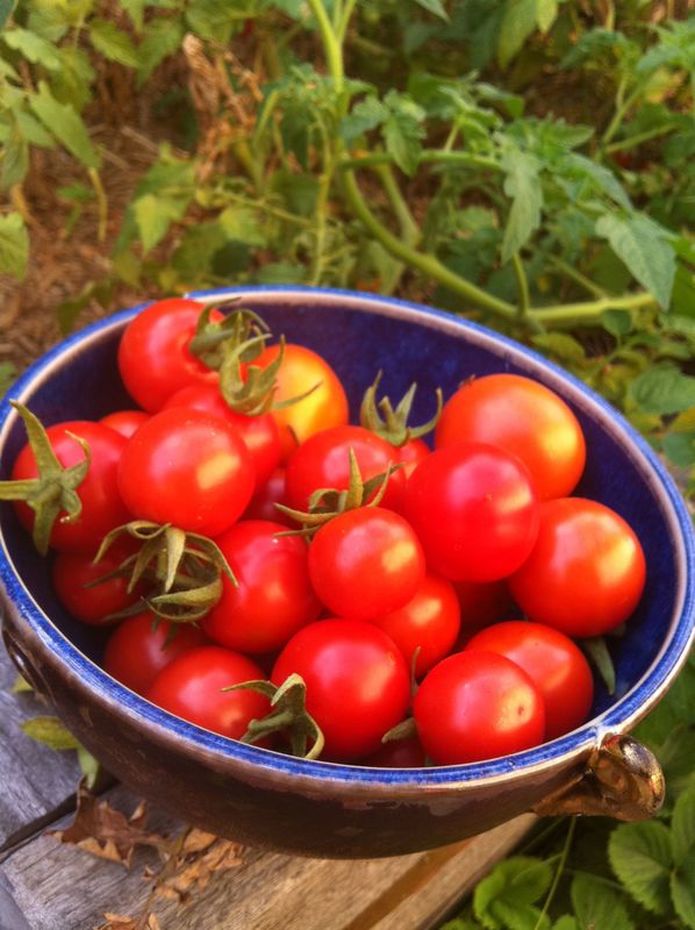 Your daughter's journey into womanhood is directly influenced by what she sees around her Your daughter's journey into womanhood is directly influenced by what she sees around her We cross the bridge into adulthood having watched how our parents treat and talk (or don’t talk) about their own bodies, relationships and needs, and this can go a long way to supporting our own positive sense of our body and self. Imagine you’re a baby getting your nappy changed. Your mum screws up her face and says ‘Stinky poo!’ You don’t understand the words yet but you hear the disapproving tone as she cleans up the ‘mess’ that you had enjoyed pushing out. Over time, you learn to hide your bodily pleasure. Imagine you’re a toddler, and your parents teach you to wash yourself ‘down there’ and never actually use the word vulva. Over time, you learn that talking about your sexual organs is not acceptable. Imagine you’re primary school age, and it’s normal for you to hear your mum complaining about her weight, wishing that her belly were smaller, comparing other people’s legs to hers and seeing her go on diets. Over time, you learn to compartmentalise and objectify your body. Imagine you’re a teenager, and your parents have only ever talked with you about sexuality once, when your body first started changing. They’ve never talked with you about the pleasures of intimacy with a partner. Over time, you learn that this is not something you learn about or discuss with your loved ones. Developing a healthy connection to your sexuality begins early in life and continues through your primary school years, even before puberty’s changes. Five-year-olds can learn about consent and internalise their rights and skills in giving a clear yes or clear no to how they are treated by others. I’ve heard that sexual predators prey on the less confident children. If a child doesn’t know the parts of their body or can’t speak up about their boundaries, it’s easier to keep them silent around something they sense is shameful. Criteria for emotional well-being … and sexual interest and satisfaction If a young person has low self-esteem, limited ability to self-soothe, poor coping skills and negative body image, they will struggle, according to Evelyn Resh, author of The Secret Lives of Teen Girls. We want our children to connect with themselves and their own needs, and enjoy intimate relationships. Resh’s criteria for this are: Reflection questions and/or strategies for parents from Secret Lives of Teen GirlsAround your own approach
Around conversation about bodies and sexuality Normalise sex and sexuality in conversations, both with your daughter and in your own life.
Around self-care She needs to see you live a life that includes sensual pleasure for you! How do you feel about your own body? Are you connected to your menstrual cycle and its associated changes in body, mood and energy?
Around rules Reflect on your experience as a teen and your parenting now. Are you repeating your mother’s style or have you adapted your rules to what’s appropriate for your daughter and these times?
Around Sexually Transmitted Infections (STIs)
The cost of hidden stress and why we need to speak up Let's be warriors AND magic-workers Let's be warriors AND magic-workers When the body says no: Exploring the stress-disease connection, Mate, Gabor, 2003, John Wiley & Sons, Inc, NJ. This book both shocked and inspired me. It may seem odd that I’m referencing a book called When the body says no: Exploring the stress-disease connection from my Daughters and Sexuality workshop, but I really believe we need to help our children to listen to their bodies, recognise what they need (and deserve to have), and then have the confidence to speak up for this, either in relationships or with health professionals. This book freaked me out a little, because it looks at all the ways that putting others before yourself, denying your own needs (and gut feeling, which can be ignored so often that you no longer recognise it), staying cheerful and repressing anger lead to long-term stress on your body, which can then emerge with scary effects on your auto-immune system. And parents beware: we learn these ‘skills’ from our family of origin. Maté’s seven As of healing - and how I believe they relate to your daughter's sexualityAcceptance The willingness to recognise and accept how things are, and the courage to permit negative thinking. Awareness We can learn to read symptoms not only as problems to be overcome but as messages to be heard. Anger Repression of anger is a major risk factor for disease, but anger differs from rage or hostility. Healthy anger is an empowerment, but repression and rage represent fear of the genuine experience of anger. Autonomy People suffer when their boundaries are blurred. Boundaries and autonomy are essential for health. Autonomy is the development of that internal centre of control. Attachment Connection is vital to healing. Behind our anger lies a deeply frustrated need for truly intimate contact. Healing both requires […] regaining the vulnerability that made us shut down emotionally in the first place. Assertion Assertion challenges the belief that we must somehow justify our existence. It is being, irrespective of action. Affirmation Health rests on 3 pillars: the body, the psyche and the spiritual connection. To ignore any one of them is to invite imbalance and dis-ease. Now, this is a mighty list of ideas, and I'm not saying that you're doomed if you're not perfectly well-adjusted. Believe me, I have to put my hand up for plenty of mistakes and bad habits in how I live and relate to others. All we can do is keep building our awareness and compassion, for ourselves as much as for those around us. But if you’re true to yourself, speaking up for what you like and don’t like, you’re much more likely to have friendships, relationships and sexual experiences that are mutually pleasurable, fun and nurturing for you. Which means that you can live sustainably and well, doing good and caring for our world. And I don't know about you, but that's all I'm after. World peace and a great life for everyone. References I mention in my Daughters and Sexuality workshopHere’s a list with some overview of what each reference is about. If you recall one that I mentioned that isn’t here, please ask me! I have a resource booklet that includes reviews, resources and quotes from them, which you can email me to purchase a copy for $15 plus postage. : )
TED Talks Listening to shame and The power of vulnerability by Brene Brown. Her work is powerful. If you haven’t seen these or read any of her books, please do! A Blessing not a Curse: A Mother daughter guide to the transition from girl to woman, Bennett, Jane A great guide, with stories, practical tips and great cultural stories, too. The Secret Lives of Teen Girls: What your Mother Wouldn't Talk About but your Daughter Needs to Know, Resh, Evelyn 2009, Hay House Inc, California, USA. This was the book that inspired me to first present this workshop on daughters and sexuality. I highly recommend it. Queen Bees and Wannabes Wiseman, Rosalind. Really readable, insightful and practical, including examples of what to say to your daughter in various tricky friendship situations, looking also at pressures of body image and expectations in teen relationships. Eye-opening and helpful. Things Girls Need from their Fathers An article from the Huffington Post, posted 06/18/2013. This is really great for all parents to read, and makes infinite sense. As soon as you have a baby is a great time to read this! Linked to a similar article for what is needed from mothers. Talk Soon. Talk Often. A guide for parents talking to their kids about sex. Free downloadable booklet from Government of Western Australia Departent of Health. A great guide for what is appropriate to say when, with examples. Nice layout with lovely pics, too! When can teenagers have a partner sleep over? Article by Maddy Silver, Sydney Morning Herald 17/3/14. Really great food for thought. Compares the Netherlands and the USA; in the former case, with parents more open and accepting of teen sexual relationships, there’s less teen pregnancy. Puberty Girl Movsessian, Shushann 2004 Allen and Unwin, Sydney. This is for mature pre-teens and teens – really friendly language that tells you the straight-up facts in a non-medical way. TED Talk: Your body language may shape who you are, Cuddy, Amy (who also researched and wrote the great book called Presence: Bringing your boldest self to your biggest challenges, 2016 Orion, London. Great research on power poses and how you can develop greater self-confidence.
1 Comment
Do you listen to your body?
If you get to a yoga class or the gym a couple of times a week, eat as well as you can and don’t often punish your body, why aren’t you feeling vibrant? Women are really good at getting the job done and looking after everyone else - and everyone else’s projects. Many of us are ok at self-maintenance, too. But we need more. The trouble is, we often see other people’s needs as more urgent than our own. Don't pass on martyr practices If you want your daughter to avoid the self-sacrifice trap, you need to show her the way. As girls, very few of us were taught or given great role models of self-care, let alone inspired to listen to our bodies as a top priority. Every week, every day, your body and your menstrual cycle are telling you something. Here's an example of what you can do to listen. 1. Take a few minutes each day Jot down what you noticed about yourself that day. I do it just after I’ve got into bed. A few words or symbols for things like:
2. Find the gold You’ll start to notice patterns, and within a couple of months, you can begin to anticipate how you’re likely to be feeling. This is gold. 3. Use the gold Plan around what you can anticipate. It's great to recognise your needs, but that's just one part. You can only make huge and positive shifts in your health and well-being when you consider it urgent to take action on nurturing yourself. Here's what you can do For example, after charting your cycle, you'll know you’re close to a low energy period (pardon the pun), and you can do something about it. Instead of becoming fed up and overworked at a time when you’re feeling extra sensitive and low in energy, you can neatly sidestep that sense of overwhelm by rearranging your schedule or allowing shortcuts for yourself before you reach the end of your tether. Time to shine There are other advantages, too. For women who want to
Even if a woman never wants to become a parent, it’s handy to know when you are ovulating (releasing an egg that could be fertilised to make a baby). It’s a great time to plan for parties and being productive, as our body’s hormones are telling us that now is the time to get out there and shine! Self-care has extended benefits If you can get into this practice of self-care and share it with your daughter, it will benefit both of you. And those who live and work with you. Our own well-being isn’t just important; it’s an urgent priority. Please have a play in our new look website or get in touch if you'd like to know more. Have a wonderful and fulfilling day! Warmly Janoel Now taking bookings for 2016: A Celebration Day for Girls 1.5 day workshop for 10-12 year old girls and their mother/female carer Step into Womanhood Mother Daughter Bali Retreat July 2016 for 11-13 year old girls and their mother/female carer. Coming up soon: Fathers Celebrating Daughters workshop with Janoel Liddy for fathers of tween and teen girls to prepare for a positive transition to puberty and growing up. Monday 23 November 2015 7.00 pm – 9.00 pm Venue: 108 Cramer St (Cnr Gilbert Road), Preston West Cost: $35 For the workshop and resource materials Enquiries/Bookings: Janoel Liddy on ph: 0408 664 919 or email: [email protected]  Nearly every birthday and Christmas, I fret over what to give my children. Will they like it? Will they use it? I try to recall what my parents did for me at the same age. It’s so long ago I can’t bring to mind specific examples, just a general – vibe of the thing. My expectations, my parents’ concern, pride and love. It's similar to talking with our sons and daughters about their body and sexuality, really. Girls can be told about the menstrual cycle and reproductive functions in a matter of minutes, but what matters a lot more is what they witness of the women in their life and the attitudes they have to their own body. We can give them attitude Body image, self-esteem, sensuality, sexuality, self-pleasure, self-respect, self-care – we want our girls to have all these as they mature. We don’t want them growing up too early; being sucked into obsession about their looks, or worse: self-hatred; eating disorders; depression or anxiety. So let’s honour the almighty power of the mother figure (pardon the pun). It takes a while One of the key findings that became clear from the research project I volunteered with last year was that a woman’s understanding of her body comes from many experiences and conversations over years. Not just one talk or one school period (ok, no more puns). So mothers/carers here’s the thing: if you want your daughter to be friends with her body and her cycle, she needs to see and hear about it many times over. A woman has 35 to 40 years to dance with her cycle, and a lifetime of being in her own skin. If you want your daughter to become a woman who is comfortable with her body, clear on what she needs for self-care and (yes, I’ll say it) has respectful and satisfying sexual relationships with exquisite intimacy, you are in the best position to help her develop that gift of healthy self-esteem. Get in there In all the programs I do, we always involve the parents of the young people we work with. We educators can be inspiring and open up conversations as we work with them for a day or a week or a series of sessions, but you are with them for a lifetime. In November I’m offering another Celebration Day for Girls, to prepare and welcome 10 to 12 year old girls and their mums/carers to puberty’s changes and getting their period. We start with a mothers-only evening session. We go through the contents of the day program with the girls and reflect on what it was like for us when we were that age. I love these nights, because the women who choose to enrol their girls in a Celebration Day are motivated, interesting people. They want to make a positive difference to their daughter’s experience of puberty and womanhood, and are willing to try something new (or follow up on that great workshop they heard about from other women!). Everyone's approach is different Some mums are confident talking about bodies and periods, and many mums aren’t. Some girls are curious and ask their mum about it, others say they are not ready, occasionally some are even hostile. Before one of our workshops, often girls will be giggly and say with a roll of their eyes that their mum is making them do the day. Most girls, though, really really want to know. And the stats show that girls who feel positive about getting their period tend to have a better experience, both physically and emotionally. Down the track after a Celebration Day, women often tell me that while they already had a good relationship with their daughter, sharing the day together simply opened up new conversations and ways of being together. This is deeply satisfying for me to hear; it’s a rich and rewarding experience to support girls and women on their journey. Be kind to yourself Just about all of us do a lot for others. Taking care of yourself, though, is a really important way for you to provide for those around you. Give yourself time out, even if it's just a few minutes. Be positive about your body. Your daughter will be a witness to your random acts of self-kindness. If she learns to look after herself, your gift will be long-lasting. As I said, it’s not the gift-wrapped present that she’ll remember, it’s the vibe of the thing that counts. If you’ve already shared the day with your daughter, please forward this to parents of girls in your community. The greatest compliment you can offer a facilitator whose workshop you have enjoyed is positive word of mouth. |
Author
-Janoel Liddy is passionate about girls and women recognizing and acting on their needs to lead a satisfying life. She teaches puberty and wellbeing to girls and boys in schools, facilitates workshops and retreats and works with groups in TAFE, university and community organisations in training and events. She is a mother of two with her partner of over two decades and dances, cooks, reads and writes when she can and must. Categories
All
Archives
April 2018
|



 RSS Feed
RSS Feed